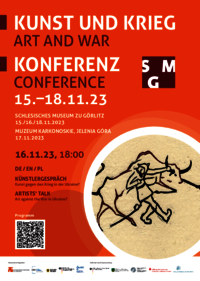Aktuelles / aktualności
Call for Papers
31. Tagung des Deutsch-Polnischen Arbeitskreises für Kunstgeschichte und Denkmalpflege
Nach dem Krieg. Kunst und Architektur
9.–12. Oktober 2024, Architekturmuseum in Breslau/Wrocław
Jeder Krieg sollte der letzte sein; keiner war es. Alle brachten neben Leid und Zerstörung bis dahin unvorstellbare Veränderungen mit sich, die man in der Nachkriegszeit zu bewältigen versuchte – unter anderem durch neue Narrative in Architektur, Städtebau, Malerei, Grafik und anderen künstlerischen Ausdrucksformen, und auch durch Neuinterpretationen der (Kunst-)Geschichte. Die Tagung führt das Thema unserer letztjährigen Konferenz „Kunst und Krieg“ weiter und fragt nach Stellenwert und Rolle von Kunst und Architektur in Nachkriegszeiten.
31. konferencja Polsko-Niemieckiej Grupy Roboczej ds. Historii Sztuki i Konserwacji Zabytków
Powojnie. Sztuka i architektura
9–12 października 2024, Muzeum Architektury we Wrocławiu
Każda wojna miała być tą ostatnią. Żadna nie była. Wszystkie przynosiły – oprócz cierpień i zniszczeń – niewyobrażalne wcześniej zmiany, które próbowano oswajać między innymi poprzez nowe narracje i interpretacje (np. historiograficzne), formułowane za pomocą różnorodnych form wypowiedzi artystycznej: architektury, urbanistyki, obrazu, rysunku, grafiki i in.
Tegoroczna konferencja kontynuuje dyskusję rozpoczętą na naszym ubiegłorocznym spotkaniu pod hasłem „sztuka i wojna”, podejmując wciąż aktualny temat miejsca oraz roli sztuki i architektury w rzeczywistościach powojennych.
Call for Papers PL
31st conference of the Polish-German Working Group for Art History and Monument Preservation
Postwar. Art and Architecture
Every war was supposed to be the last one. None of them actually was. All of them brought not only suffering and destruction, but also changes unimaginable ahead. Efforts have been made to tame them through new narratives and interpretations, such as historiographical accounts, and to articulate them through various forms of art, including architecture, urban planning, painting, drawing, and graphics.
In addressing the role of art and architecture in post-war realities, the conference builds on our last year’s discussion on ‘Art and War’.
Call for Papers EN
Tagungsprogramm / program konferencji
Kunst und Krieg
30. Tagung des Arbeitskreises deutscher und polnischer Kunsthistoriker und Denkmalpfleger im Schlesischen Museum / Muzeum Śląskie zu Görlitz/Zgorzelec und im Muzeum Karkonoskie / Riesengebirgsmuseum in Jelenia Góra/Hirschberg, 15.–18. November 2023
Auf seiner Jahrestagung im November 2023 in Görlitz hat der Arbeitskreis eine Namensanpassung vorgenommen und heißt nun Deutsch-Polnischer Arbeitskreis für Kunstgeschichte und Denkmalpflege / Podczas konferencji w Görlitz w listopadzie 2023 dokonano korekty nazwy grupy na Polsko-Niemiecka Grupa Robocza ds. Historii Sztuki i Konserwacji Zabytków.
